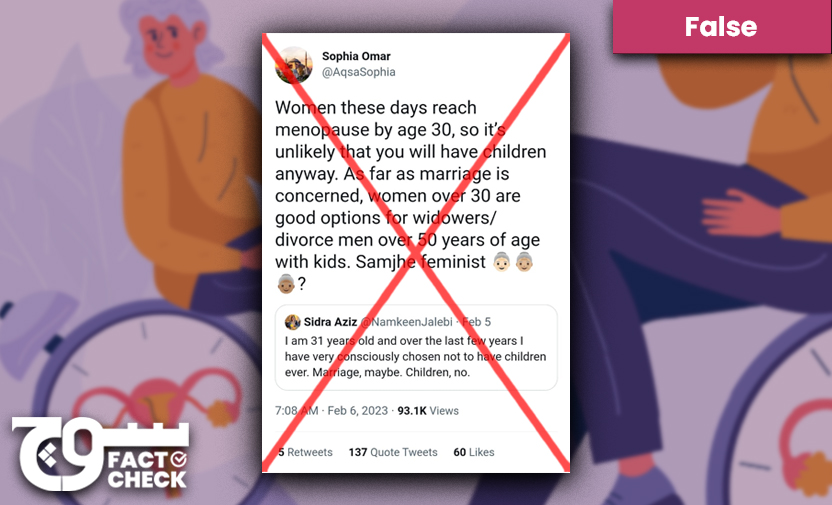
Claim: Women these days reach menopause by age 30.
Fact: It is factually incorrect that women these days reach menopause by age 30. Two gynaecologists that Soch Fact Check spoke to, as well as a number of peer-reviewed research papers and studies, prove that women in Pakistan reach menopause around the age of 47-55. Furthermore, “a small percentage of women” or about 1% experience premature menopause, with a 2017 study stating “2% of the women experiencing premature menopause and 7.6% early menopause”.
On 6 February 2023, Twitter account @AqsaSophia — who goes by the name Sophia Omar — posted a tweet stating (archive) that women these days reach menopause by age 30.

In the face of backlash over what people claimed was dangerously misleading information, @AqsaSophia wrote (archive), “I am a practicing Gynaecologist. Graduated from Johns Hopkins University.”
Fact or Fiction?
Soch Fact Check spoke to two gynaecologists about the average age for menopause..
Dr Nighat Shah, an obstetrician-gynaecologist (Ob-Gyn) and head of the department at the Jinnah Postgraduate Medical Centre (JPMC), said the average age women in Pakistan experience menopause is 51.
“Menopause can occur early, sometimes, in younger females as part of cancer treatment or, sometimes, ovaries become resistant or early ovarian failure may occur at any age,” Dr Shah said when asked if there are women who experience menopause earlier than the average age. It can be “as early as 19 or 20 years, too,” in the aforementioned cases.
There are a number of reasons why a woman might experience menopause earlier than usual. If the patient doesn’t have hormone-dependent cancer, such as breast cancer, the treatment could be hormonal treatment, she said.
Dr Zeenat Eva Khan, currently associated with the National Medical Centre (NMC) in Karachi and formerly a senior lecturer at The Aga Khan University’s (AKU) Department of Obstetrics and Gynaecology, told Soch Fact Check that in Pakistan, menopause occurs “on an average of 47 years” although nutritional factors are important as well.
Interestingly, Dr Khan pointed out that women from the middle- to higher-income brackets “are getting their periods later than usual” but stressed that bleeding over the age of 52 may be a harbinger of endometrial cancer.
“We see a small percentage of women, about 1%, with premature menopause that [occurs at] less than 40 years [of age],” the Ob-Gyn said. She explained that this could be due to chromosomal abnormalities or nutritional or psychological problems like bulimia and anorexia nervosa, both of which are eating disorders (EDs).
Definitions related to menopause
Premature menopause is when menopause happens before age 40, whereas early menopause occurs between 40 and 45, according to the US Department of Health & Human Services’ (DHHS) Office on Women’s Health.
It is also important to note that according to John Hopkins Medicine, perimenopause “is the time around menopause when your ovaries gradually stop working” or a phase that may last several years before a woman’s last period.
Moreover, Primary Ovarian Insufficiency (POI) is also called Premature Ovarian Failure (POF), according to MedlinePlus, the National Institutes of Health’s (NIH) National Library of Medicine (NLM).
Prior peer-reviewed research studies
Soch Fact Check also perused different peer-reviewed research articles on the same topic.
In a research titled ‘Age at menopause, and knowledge of and attitudes to menopause, of women in Karachi, Pakistan’, published in 2006 in the Journal of the British Menopause Society, Dr Lubna Ansari Baig and Dr Saadiya Aziz Karim state that the “mean age at menopause in Karachi was 47 years.”
Professor Baig is currently the chairperson of Jinnah Sindh Medical University’s (JSMU) APPNA Institute of Public Health, while Dr Karim — a gynaecologist at Karachi’s Life Line Hospital — has previously taught at Dow Medical College (DMC), The Aga Khan University (AKU), Karachi Medical and Dental College (KMDC), and Abbasi Shaheed Hospital (ASH).
In another research titled ‘Perceptions of menopause among rural women of Lahore’, published in 2003 in the Journal of College of Physicians and Surgeons Pakistan (JCPSP), Samira Yahya and Naghma Rehan reported that “the mean age at menopause was 49 +/- 3.6 years.”
Yahya has taught at Shaikh Zayed Postgraduate Medical Institute Lahore (SZPMI) and Rehan at Fatima Jinnah Medical College Lahore (FJMC).
In yet another research titled ‘Early menarche, nulliparity and the risk for premature and early natural menopause’, published in 2017 in the Human Reproduction — of the European Society of Human Reproduction and Embryology — Professor Gita D. Mishra, the lead researcher, alongside 19 others, found “2% of the women experiencing premature menopause and 7.6% early menopause”.
Professor Mishra teaches at the University of Queensland and her study comprised over 51,000 “postmenopausal women from nine observational studies in the UK, Scandinavia, Australia and Japan”.
A research paper titled ‘Premature Menopause’, published in 2013 in The Annals of Medical and Health Sciences Research and conducted by Dr Titus Chukwuemezie Okeke, Ugochukwu Bond Anyaehie, and Dr Cyril Chukwuma Ezenyeaku states that “premature menopause affects 1% of women under the age of 40 years”.
Berek & Novak’s Gynecology (2007) by Emil Novak states, “Premature ovarian failure, defined as menopause before the age of 40 years, occurs in approximately 1% of women. It may be idiopathic or associated with a toxic expo- sure, chromosomal abnormality, or autoimmune disorder.”
Global health bodies
The NHS inform — Scotland’s national health information service — explains that “premature menopause is estimated to affect 1% of women under the age of 40 years and 0.1% of women under the age of 30 years” and “a spontaneous (natural) early menopause affects approximately 5% of women before the age of 45”.
According to the NIH National Institute on Aging (NIA), “The menopausal transition most often begins between ages 45 and 55. It usually lasts about seven years but can be as long as 14 years.”
The World Health Organization (WHO) states, “Most women experience menopause between the ages of 45 and 55 years as a natural part of biological ageing.” Moreover, premature menopause, before 40 years of age, “may be because of certain chromosomal abnormalities, autoimmune disorders, or other unknown causes”.
The Centers for Disease Control and Prevention (CDC) and The Aga Khan University Hospital (AKUH) say the same.
Furthermore, Soch Fact Check found no research or article about the age of experiencing menopause declining among Pakistani women.
Interestingly, Twitter user @2020sThings (archive) pointed out under the main tweet by @AqsaSophia that the latter “spelled ‘gynecologist’ the European way instead of the American way… No way she went to Johns Hopkins”.
Two Pakistani doctors — here and here — also identified the rare condition being mentioned as POF, while a third user said it could be POI.
John Hopkins denies existence of alleged student
To get further clarification on the identity of Sophia Omar, or @AqsaSophia, Soch Fact Check reached out to Johns Hopkins University (JHU).
JHU Science Communications Manager Roberto Molar Candanosa, part of the University Communications department, responded, saying, “None of those names were found in our database.”
Virality
Soch Fact Check found that the three tweets by Sophia Omar, or @AqsaSophia — here (archive), here (archive), and here (archive) — got more than 93,100, 13,300, and 11,100 views, respectively.
Twitter user @clouds789, whose tweet got close to 100 views, also repeated the same claim, writing (archive), “Menopause on 30s is very common nowadays.”
Conclusion: Two gynaecologists that Soch Fact Check spoke to, as well as a number of research papers and studies referenced above, prove that women in Pakistan reach menopause at around 47-55 years of age. We found no research or article about the age of experiencing menopause declining among Pakistani women. Furthermore, “a small percentage of women”, or about 1%, experience premature menopause, with a 2017 study stating “2% of the women experiencing premature menopause and 7.6% early menopause”. Therefore, it is factually incorrect that women these days reach menopause by age 30.
Background image in cover photo: Freepik
